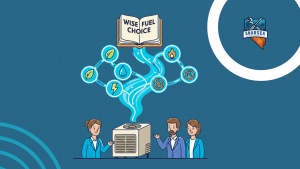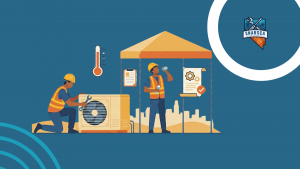In a rapidly evolving technological world, every industry is experiencing significant transformation, and HVAC is no exception. The heating, ventilation, and air conditioning sector is undergoing a digital revolution, one where intelligence, efficiency, and user-centric design take center stage. At the core of this shift lies the integration of smart technology, which is redefining how we approach indoor comfort, energy consumption, and maintenance. This marks a new era of bold, data-driven systems powered by intelligent HVAC.
This blog explores how smart innovations are shaping the future of HVAC, offering insights into new trends, systems, and how professionals and homeowners alike can adapt to this smarter, more connected era of climate control.
The Rise of Intelligence in HVAC Systems
Gone are the days when HVAC systems operated in isolation, relying on manual settings and periodic maintenance checks. Today’s systems are equipped with advanced sensors, artificial intelligence, and Internet of Things (IoT) capabilities that allow them to analyze conditions, optimize performance, and even predict failures before they occur.
This evolution is not just a technological upgrade—it’s a complete transformation in how we manage and interact with our environments. It also represents the future of sustainable HVAC, where innovation meets responsibility. Whether in residential homes, commercial buildings, or industrial facilities, HVAC systems are becoming smarter, more responsive, and dramatically more efficient.
What Is Smart HVAC?
To understand this shift, we must first answer a basic question: What is smart HVAC? In simple terms, smart HVAC refers to an intelligent heating, ventilation, and air conditioning system that uses connected devices and software to automate, monitor, and enhance indoor climate control. This seamless integration defines the power of smart HVAC technology, bringing automation and real-time adaptability into everyday comfort.
These systems leverage sensors, Wi-Fi connectivity, cloud computing, and machine learning to make real-time adjustments based on factors such as occupancy, outdoor weather, time of day, and user preferences. Instead of simply reacting to thermostat inputs, a smart HVAC system learns over time and delivers optimized comfort with minimal energy use.
Benefits of Smart HVAC Systems
Implementing a smart HVAC system provides a range of benefits for both users and technicians. For homeowners and business operators, the most obvious advantage is energy savings. With intelligent zoning, remote access, and automatic scheduling, smart systems eliminate wasteful energy use.
Comfort is also significantly improved. These systems ensure consistent temperatures, humidity control, and air quality based on real-time feedback. In commercial applications, this translates into a more comfortable working environment, reduced sick days, and better productivity. HVAC Smart business systems often include predictive maintenance alerts and remote diagnostics, allowing service providers to address issues before they become costly repairs.
The Role of HVAC Automation
As part of the broader smart building movement, HVAC automation is emerging as a game-changer. This involves the automatic regulation of HVAC components based on inputs from environmental sensors, energy consumption targets, and occupancy data.
Automation enables systems to dynamically adjust airflow, temperature, and even lighting in tandem, ensuring that energy is used efficiently across the building. Advanced building management systems (BMS) are now integrating HVAC with lighting, security, and fire systems for holistic environmental control. By integrating HVAC with automated systems, these facilities can maintain stability, reduce operating costs, and comply with strict regulatory requirements.
The Future of HVAC Design and Implementation
Looking ahead, the future of HVAC is centered around integration, sustainability, and personalization. Systems will become even more intuitive, with natural language interfaces, voice control, and seamless mobile integration. At this stage, the focus will shift heavily toward smart HVAC optimization, ensuring peak performance and reduced waste.
Cloud-based management platforms will allow facility managers to control multiple locations from a single dashboard. Meanwhile, homeowners will be able to track their energy usage and indoor air quality from their smartphones in real-time.
As global concerns about climate change and energy efficiency intensify, the HVAC industry will also embrace more sustainable technologies. Expect to see wider adoption of geothermal heat pumps, solar-powered air conditioning, and energy recovery ventilators. Smart HVAC systems will not only improve comfort but also significantly reduce the carbon footprint of buildings.
To support the next generation of professionals driving this innovation, SNARSCA offers scholarships for HVAC training, helping aspiring technicians build strong, future-ready careers.
Challenges and Considerations
While smart technology in HVAC offers immense promise, it also comes with challenges. Integration with existing infrastructure can be complex, especially in older buildings. Data security is another concern, as connected devices introduce vulnerabilities that must be properly managed.
To successfully navigate these challenges, HVAC professionals must stay updated on the latest technologies, certifications, and installation techniques. Training in smart systems and automation is becoming essential for technicians who want to stay competitive in the field.
HVAC Climate Control: The Next Frontier
One of the most exciting aspects of smart HVAC is its potential to revolutionize HVAC climate control. Instead of a one-size-fits-all approach, we’re moving toward highly personalized comfort based on lifestyle habits, time zones, and real-time occupancy.
Imagine a system that cools your home 10 minutes before you arrive, adjusts airflow based on how many people are in the room, and boosts ventilation during high pollen days. All of this is becoming possible with advances in smart sensors and cloud-based analytics.
Climate control is no longer limited to just temperature—it now includes air quality, humidity, CO2 levels, and even VOC (volatile organic compound) monitoring. Smart systems can automatically purify the air, adjust humidity, and ensure ventilation is aligned with comfort and health standards.
Final Thoughts: Embracing the Smart HVAC Movement
The HVAC industry is at the cusp of a technological revolution. As homes and businesses demand smarter, greener, and more efficient solutions, embracing smart technology is no longer optional—it’s essential.
From HVAC automation and remote diagnostics to AI-driven energy optimization and personalized HVAC climate control, the benefits are far-reaching. These innovations not only enhance user comfort but also help reduce energy costs and environmental impact.
As professionals and consumers become more aware of the advantages of smart systems, adoption will continue to accelerate. And while challenges remain, the direction is clear: the HVAC industry is moving toward a future that is not only intelligent but also sustainable, responsive, and deeply connected.
If you’re an HVAC technician, contractor, or homeowner, now is the time to embrace this shift. The smart HVAC revolution is here—and it’s only just beginning.


